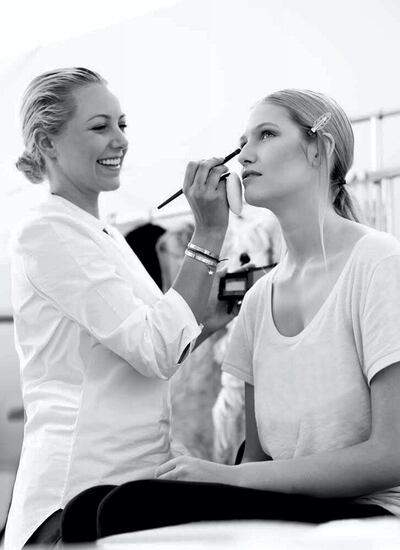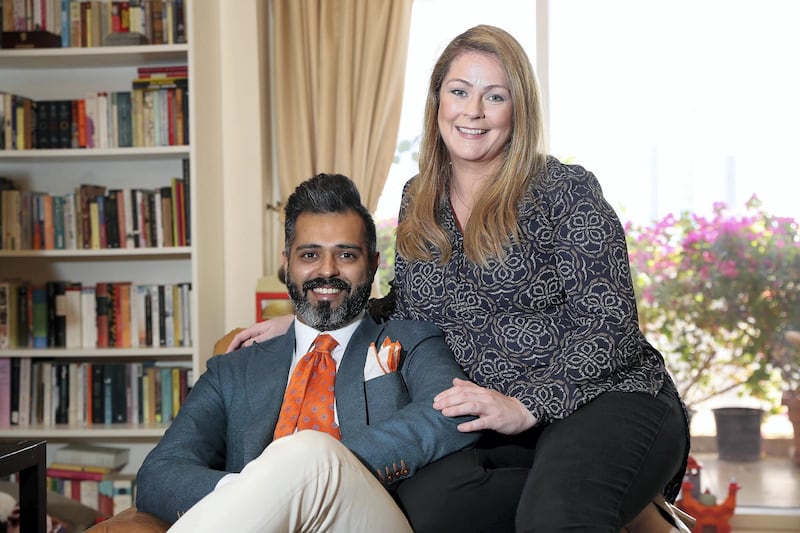The UAE is the fourth-best country in the world to freelance in, according to a recent study by the UK business site Expert Market.
The country ranked after Hong Kong, the US and South Korea on a list of 57 countries, based on a scale weighing the cost of living, cost of starting a business, income tax rates, access to credit, average internet speed, transport networks, how widely free Wi-Fi was available and the cost of a coffee.
Despite the advantages, there are real challenges freelancers have to face - namely how to balance their personal finances with an unpredictable income.
Steve Cronin, the founder of DeadSimpleSaving.com, which helps residents invest their money sensibly, says freelancers have to adopt an approach of managing their own one-person business, knowing there is always risk that people won’t pay or you won’t charge properly for your time.
“As a freelancer you hopefully don't have high work-related expenses, but you most likely have lumpy or unpredictable sources of income,” he says. “You have to manage your cash flow to make sure you can pay large expenses like rent.”
He recommends freelancers get familiar with Excel to track current and projected income and expenses, both for work and home. He also advises having at least three to six months' worth of total expenses in a bank account as an emergency buffer, including rent; and try to develop small, regular sources of income to offset the times you are waiting for payments from larger projects.
Once a sufficient savings buffer has been reached, he advises investing the rest, making sure the money is accessible in an emergency. Long-term savings plans are not advised, and freelancers need to be careful about tying their money up in property, too, he says.
Here three freelancers based in the UAE reveal how they manage their money:

Toni Malt, 41, a freelance makeup artist from Germany, based in Dubai
When Ms Malt set up 10 years ago she used to worry if too many days went by without work. These days, with experience having shown that a big job is just around the corner, she has learnt to relax.
“As a freelancer the rates are quite high,” she explains. “And once you hit a multi-day advertising job, you’re fine.”
Ms Malt takes an unstructured approach to budgeting, bills and saving: any extra money flows into the next month, her bills are always paid, and she’s not on a mission to save, secure in the knowledge she has savings in Germany to fall back on. With two dogs and nine rescue cats, her biggest variable is veterinary bills. Some months, she has spent Dh30,000 on her pets.
“Once a year I’ll do a budget, just to make sure I understand what I’m actually spending, monthly, like dog food, vet visits and salaries for maids,” she explains. “But during the year I don’t really watch out for it that much, because it always works out. I never get to a point where I run out of money.”
Ms Malt, who is opening her own makeup artistry school next month - Toni Malt Academy in Al Quoz - still faces the same late payment issues all freelancers do.
“Once you in and you are rolling there’s always going to be money coming in somewhere,” she explains. “But then you might have some outstanding jobs which haven’t been paid for six to nine months.”
______
Read more:
How to register for VAT as a freelancer in the UAE
[ UAE freelancers challenged by VAT as companies begin refusing to work with unregistered individuals ]
_______
Paul Emous, 34, a freelance photographer, from The Netherlands based in Dubai
Mr Emous says the first thing he did, when he decided to work for himself nine years ago, was create an Excel spreadsheet and look at all his planned costs – housing fees twice a year, visa, business license, health insurance, transportation, utilities – as well as any unplanned, such as a car repairs. He then implemented a buffer, which he considers one of the most important tools for a freelancer to have to cope with the ebb and flow of work.
“You need to plan a couple of months in advance and adjust the buffer for slower months and planned expenses,” he says.
Saving in the busy months for the slower times, and establishing a reserve for unexpected costs and late or absent payments - the scourge of freelancers everywhere - is key to riding out the uncertainty of not having a regular pay cheque.
Mr Emous, who established his own company Mouse Media, and now employs three freelancers, tends to invest in new technology whenever possible as a way to build his business and offer existing clients the best service. He is prone to giving discounts as an incentive for clients to pay within the month, which helps him to handle bigger jobs with more upfront costs.
Mr Emous does try to plan for the future, with an eye to investing in property in Europe, however, he has expensive hobbies, such as diving, cave exploring, quad biking, skydiving and travelling eat into his income.
“Of course the future is important, trust me, I have a girlfriend, we’re really serious and we are planning for the future,” he says. “But at the same time, people forget that they live today and God forbid if you get hit by a bus, can you say that you were happy with the stuff that you did?"
______
Read more:
How to budget on a roller coaster income
Make your budgeting plan, then stick to it
_______
Evelyn Hester-Wyne, 38, a freelance director/producer from Ireland, based in Dubai
After six years in Dubai directing and producing - she recently made a one-hour documentary about Global Village for Nat Geo - Hester-Wyne has learned that to function as a freelancer means being very organised and also very flexible.
The organisation comes in making sure the business she formed with her emcee/content producer husband, Hisham Wyne, is fully compliant with UAE laws - including the VAT introduced last year - while the flexibility involves being able to cope when payments are late rolling in.
“You fall behind of course,” she says. “So you need to behave as a saver who’s paid monthly when in fact you are a freelancer who is not paid monthly.”
Ms Hester-Wyne alternates between being hired to head up projects or asked to join a team. That means she sometimes borrows money to fill gaps in being paid, or has large sums in her bank account that have already been allocated to debts and other needs. She detests having to keep other freelancers waiting because she hasn’t been paid for the job she hired them for.
“It’s bad enough waiting for payments for myself,” she says.
The couple have twins, four-year-old Bernadette and Edith, so school fees are an ongoing concern.
“Believe me there are many nights where I sit bolt upright and say ‘how are we going to get those school fees paid’,” she said.
The couple, who have hired a bookkeeper to make sure that they are on top of their VAT requirements and their files are in order, haven't taken a real vacation since their children were born. Ms Hester-Wyne is adamant about not paying full price for their staycations or entertainment, either, seeking out whatever vouchers and two-for-one deals she can find.
“I would never do anything unless it has a voucher,” she says. “I absolutely refuse to pay full price for anything especially because there’s so many good deals around.”
______
Read more:
UAE residents cut back ahead of VAT introduction
How to budget for a surprise expense in the UAE
______
Tips for freelancers
• Evelyn Hester-Wyne, a director/producer, has a dream that one day it will be standard to pay freelancers 50 per cent of their fee up-front. For now, she advises choosing clients wisely.
“Do not be desperate enough that you take any work that’s offered from people who seem like they might renege on that payment,” she says. “Getting saddled with bad debt can be disastrous and a lot of people have suffered in the production industry because they haven’t been paid.”
• Photographer Paul Emous is adamant about insurance: business and personal liability insurance to protect him at work and health insurance that will protect him as an expatriate should he get ill or hurt. Not only does that insurance prevent future financial ruin, but it gives peace of mind in the present.
“If you don’t have that, you will be constantly running around with this in the back of your head,” he says. “You might have to go back to your own country, it might lead to massive debt.”
• Makeup artist Toni Malt says new freelancers may have to do some jobs for free to prove what they are capable of.
Combined with the always-expected issue of slow payments and unexpected costs, she believes anyone considering freelancing full time must have six months’ savings before striking out on their own.
“You can’t go freelance with no savings,” she says. “You won’t be able to pay your bills at all.”
______
Read more:
Seven in ten UAE residents unsure how to achieve their financial goals
20 tips to get your finances back on track in the UAE
______
Freelancers and VAT
Don’t rush to register
• Freelancers are tending to rush to register for the five per cent VAT when they get to the voluntary limit of Dh187,500 in taxable turnover in the previous year – the mandatory registration level is Dh375,000 – so they won’t lose the opportunity to claim their business expenses back, says Lisa Martin, a chartered accountant in Dubai who founded the accounting, auditing and VAT consultancy The Counting House. “Actually you don’t lose the right to reclaim VAT charged prior to registration. If you are growing and at some point you’re going to get to the mandatory level, you’re allowed to claim back five years worth of VAT that you’ve been charged, pre-registration, on your first VAT return.”
Keep detailed records
• Whether you have signed up to VAT or not, you should keep receipts and records for business-related expenses in case of future registration. Also, the law requires proper accounts and records for any freelancer, because you need to be fully prepared to prove to Federal Tax Authority representatives that you are either VAT compliant or that you are not required to be, she says. Ms Martin recommends cost effective and easy-to-use programs such as Xero or QuickBooks, and getting an accountant to help with setup and, if desired, monthly checkups. Anything more complicated – such as doing work for a foreign entity – should be dealt with on the advice of an accountant.
Avoid penalties from the outset
• It pays to get your VAT procedures firmly in place from the outset, says Ms Martin. Penalties for errors are steep: Dh20,000 for late registration and Dh5,000 per incorrect invoice. “






